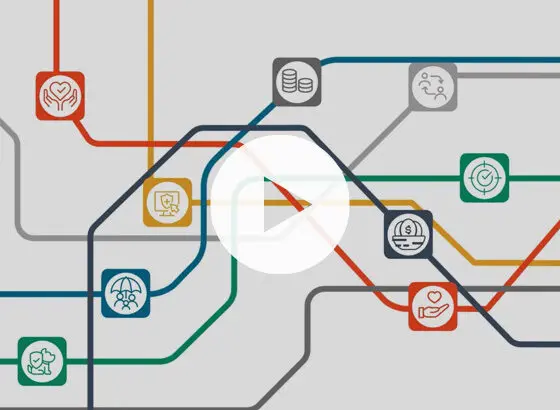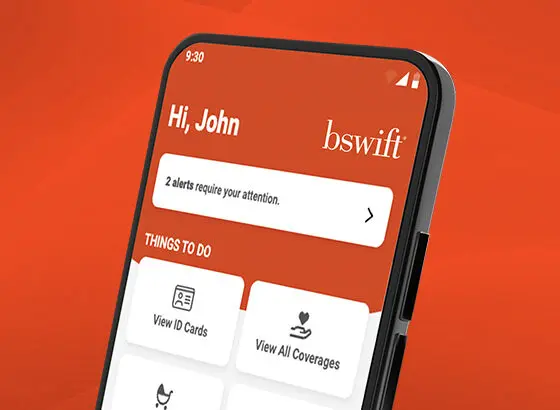The old ways of managing employee health are quite literally making us sick. We live in stressful times with work, money, and health concerns piling up. But most employee wellbeing programs only offer disconnected, one-size-fits-none solutions.
Employees need unified, personalized solutions that treat them as the wonderfully complex and unique humans they are – not just as isolated medical conditions.
And that’s why leaders from top companies discussed holistic health at bswift’s 2024 Idea Exchange conference in Palm Springs. Here’s what we learned…
1. Value-Based Care Models: Cut Healthcare Costs and Improve Employee Wellbeing
Despite all the plan tweaking and cost-shifting, healthcare costs are up. Premiums jumped up to 10% in 2024. Families are paying an average of about $24,000 a year just for health insurance, according to the Kaiser Family Foundation.
The usual culprits are driving costs:
- New medical technologies and treatments
- People skipping preventive care
- Poor health habits
- Inflation
But value-based care models are emerging as a solution. Value-based care focuses on:
- Eliminating preventive care barriers
- Leveraging virtual care and digital health tools
- Enhancing care quality through coordinated teams
- Focusing on overall wellbeing, not just medical issues
“You should be able to get a customized solution that treats the entire person – from physical therapy to behavioral health to nutrition to sleep,” said Goodpath CEO Bill Gianoukos.
The goal is to address issues before they snowball into expensive, chronic conditions. It’s a win-win for employees and employers.
2. Whole Person Care: Treating People Not Conditions
Finding ways to help people avoid chronic conditions is a big deal. Six in 10 adults are living with a chronic condition, and 4 in 10 have two or more, according to the CDC. Chronic condition management drives a mind-boggling $4.1 trillion in annual U.S. healthcare spending.
This fragmented, one-condition-at-a-time approach doesn’t drive real health improvements. A more effective strategy treats us not just as a collection of conditions, but as the beautifully complex individuals we are.
And that holistic health approach requires an integrated healthcare ecosystem that covers:
- Physical health
- Mental health
- Financial wellbeing
- Social factors
This involves building a benefits strategy flexible enough to meet employees’ needs with a robust ecosystem of partners offering solutions for each employee.
“It has to extend from the top down to what you’re serving in your cafeterias, how you’re rewarding people, how you’re encouraging work-life balance,” said Kim Evans, bswift’s VP of Partner Ecosystem, stressing the importance of this holistic shift.
RELATED: bswift Elevate™: Empowering Holistic Employee Wellbeing, Anywhere and Anytime
3. Employee Mental Health Benefits: Strategies to Reduce Burnout and Stigma
If there’s one area where that fragmented, condition-centered approach is clearly failing, it’s mental health.
The statistics lay bare a crisis for HR leaders:
- 77% of employers report increasing mental health needs
- 80% of people say it’s too expensive or difficult to access support
- 62% of people feel ashamed to get help
- 60% of psychologists say they have no openings for new patients
- 42% of Gen Z has a diagnosable mental health condition
Untreated mental health issues directly impact workplace productivity, engagement, retention, and healthcare costs. And the financial burden of healthcare can exacerbate mental health struggles. Households with medical debt have triple the rate of mental health conditions.
“Debt equals stress equals poor health,” said John Halloran, CEO of Mobile Health.
Mental fitness must be core to any holistic wellbeing strategy worth its salt. The mind-body connection is just too fundamental to ignore.
RELATED: Unlocking the Power of Employee Benefits
4. Financial Stress: How Financial Wellness Programs Boost ROI
Money tops the list of stressors, according to the American Psychological Association. And Gen Z and younger millennials report being “completely overwhelmed” by stress.
“One of the top causes of bankruptcy in the U.S. is when somebody has an illness in the family,” said Halloran. “We’re a first world country. That’s not okay.”
A whopping 86% of employees report financial worries due to medical debt, inflation, stagnant wages, and soaring costs per a SoFi report. This financial stress worsens preventable, stress-related health issues.
Despite the availability of financial wellness programs, utilization languishes at 20%-40%.
“The primary problem we’ve discovered at that level of underserved and underrepresented and lower-paid employees is that they don’t trust lawyers,” said LegalEase CEO Bob Heston, whose company focuses on legal and financial wellbeing. “I’m a lawyer, and I certainly understand that.”
Key barriers include:
- Lack of trust in advisors
- Low awareness of available programs
- Perceived complexity of accessing support
Better employee communication is part of the solution, according to Heston. Employers need to overcome these internal communications barriers to promote wellbeing solutions. Financially stressed employees are less productive and suffer higher healthcare costs.
RELATED: Solving the Employee Communication Puzzle: Tips for Better Engagement
The Common Thread: Unified, Personalized Solutions
These trends highlight the need to look at wellbeing as a whole.
bswift’s Alliance and Integration Partners offer a complete set of solutions for physical, emotional, financial, and personal health, making it easy to set up and maintain.
Ready to embrace a holistic health approach to employee wellbeing?
Let’s talk about what that looks like at your organization. Your people and business deserve a 360° path to thriving.






































